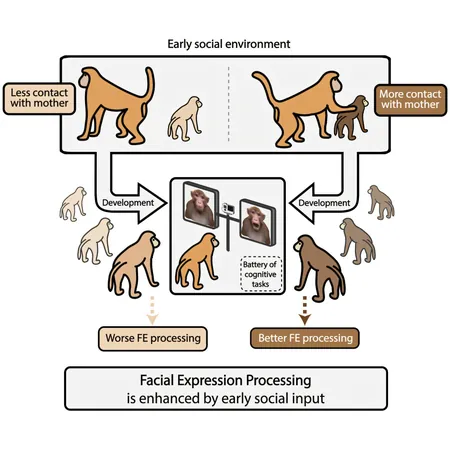
The Surprising Link Between Maternal Care and Monkey Social Skills Revealed!
2025-04-08
Author: Li
Introduction
New research uncovers a fascinating connection between the nurturing behaviors of mothers and the ability of baby monkeys to recognize key facial expressions, shedding light on the social dynamics of primates. This extensive study by Nottingham Trent University (NTU) involved observing 83 rhesus macaques from 15 distinct social groups in their first crucial weeks of life.
Methodology
The infants' interactions with their mothers were meticulously recorded over 14 weeks, focusing on vital behaviors such as grooming, physical closeness through cradling, and maternal approaches to the infant. These early experiences seem to play a critical role in the development of their social skills.
Results
Once the monkeys reached at least 1 year old, researchers tested their responsiveness to images of other primate faces showcasing various emotional expressions. This included fearsome threats and submissive gestures like bared teeth. Remarkably, the baby macaques showed heightened attention to images that depicted increased threat intensity, indicating they were not only aware of facial cues but were also sensitive to subtle variations in expressions.
Cognitive Processing
In a particularly intriguing part of the study, when the macaques were shown a sequence of identical facial expressions followed by one that was unexpectedly different, they were found to fixate significantly longer on the unusual expression. This behavior suggests a higher level of cognitive processing and recognition of social cues, further emphasizing their growing social intelligence.
Correlation Between Maternal Care and Social Skills
The findings point to a clear correlation: macaques that experienced more attentive maternal care during infancy—characterized by greater grooming and physical affection—demonstrated superior abilities in processing facial expressions. The researchers noted that this skill continued to develop with age until approximately 4 years old, highlighting how social skills are shaped by experience and environmental factors rather than merely instinctual behaviors.
Expert Opinions
Dr. Olivia O'Callaghan, who conducted the research at NTU's School of Social Sciences, emphasized the importance of strong social connections among primates. She explained that effective interpretation of facial expressions is crucial for navigating intricate social systems, which can lead to benefits such as better health, increased mating opportunities, and enhanced protection from predators.
Significance of Findings
Project lead, Professor Bridget Waller, reinforced the significance of the study by stating, “Facial expressions have evolved as a vital communication tool in primates, including humans. Our findings underscore how vital social experiences are for the proper development of these essential skills.
Conclusion
This groundbreaking research not only shines a light on the vital role of maternal care in the social learning of macaques but also invites further exploration into how similar mechanisms might operate in other highly social species, including humans. As we continue to uncover the intricacies of primate behavior, the implications for understanding our own social nature become increasingly profound—proving that the bonds we form in early life have lasting impacts that shape our ability to connect with others!



 Brasil (PT)
Brasil (PT)
 Canada (EN)
Canada (EN)
 Chile (ES)
Chile (ES)
 Česko (CS)
Česko (CS)
 대한민국 (KO)
대한민국 (KO)
 España (ES)
España (ES)
 France (FR)
France (FR)
 Hong Kong (EN)
Hong Kong (EN)
 Italia (IT)
Italia (IT)
 日本 (JA)
日本 (JA)
 Magyarország (HU)
Magyarország (HU)
 Norge (NO)
Norge (NO)
 Polska (PL)
Polska (PL)
 Schweiz (DE)
Schweiz (DE)
 Singapore (EN)
Singapore (EN)
 Sverige (SV)
Sverige (SV)
 Suomi (FI)
Suomi (FI)
 Türkiye (TR)
Türkiye (TR)
 الإمارات العربية المتحدة (AR)
الإمارات العربية المتحدة (AR)